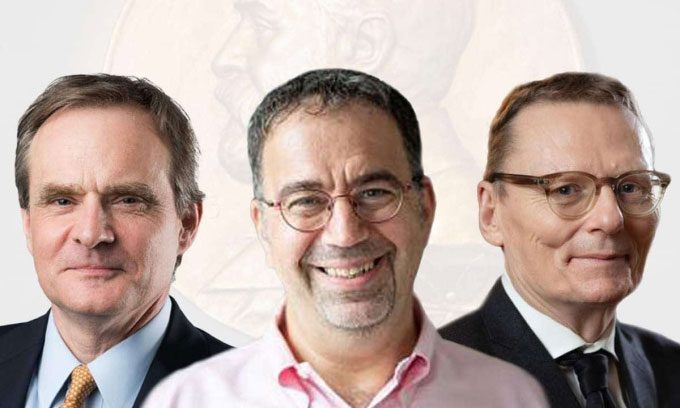3 American Scientists Awarded Nobel Prize in Economics This Year for Research on Social Institutions and Prosperity.
At 11:45 AM on October 14 (approximately 4:45 PM Hanoi time), the Royal Swedish Academy of Sciences announced that the 2024 Nobel Prize in Economic Sciences has been awarded to three American economists: Daron Acemoglu, Simon Johnson, and James A. Robinson. They received the award for their research on how social institutions are established and the impact of these institutions on prosperity.
Daron Acemoglu and Simon Johnson are both affiliated with the Massachusetts Institute of Technology (MIT), while Robinson is based at the University of Chicago. All three are authors of several well-known books on economics, including “Power and Progress” and “Why Nations Fail.”

The three Nobel Prize-winning economists of 2024. (Photo: Dang Hieu)
Daron Acemoglu, 57 years old, is renowned for his research in political economy. Simon Johnson, 61, previously served as the chief economist at the International Monetary Fund (IMF). James A. Robinson, 64, has long been a researcher focused on economic-political development in Latin America and Sub-Saharan Africa.
“Narrowing the income gap between countries is one of the greatest challenges we currently face. These scientists have demonstrated the importance of social institutions in addressing this issue,” remarked Jakob Svensson, Chairman of the Nobel Prize in Economic Sciences Committee.
Their research underscores the significance of social institutions in a nation’s prosperity. It suggests that societies with weak institutions and legal systems struggle to generate growth or improve in favorable directions.
The Nobel Prize in Economics is traditionally the last award announced each year, following those for Medicine, Physics, Chemistry, Literature, and Peace. The Nobel Prize in this field was not part of the original prize framework established in the will of Swedish scientist Alfred Nobel. It was added in 1968 to commemorate the 300th anniversary of the establishment of Sweden’s central bank, Sveriges Riksbank, which also contributes to the prize fund.
The nomination, selection, and awarding process for the Nobel Prize in Economics is similar to that of other categories. The identities of the nominees and related information are kept confidential for 50 years. The winners receive a medal, a diploma, and 11 million Swedish kronor (over 1 million USD).
To date, the Nobel Prize in Economic Sciences has been awarded 56 times. The youngest laureate was 46 years old, while the oldest was 90. American scientists currently dominate this award.
Last year, the prize was awarded to Claudia Goldin, 78, a professor at Harvard University, recognized for her research on women’s income and contributions to the labor market. The aim was to understand the mechanisms and reasons behind gender disparities in income and labor force participation. Goldin is the third woman to receive this award in the past 56 years.
Nobel Prize in Economics Winners Over the Last 10 Years:
| Year | Laureate | Work | Country |
| 2023 | Claudia Goldin | Women’s income and contributions to the labor market | United States |
| 2022 | Ben Bernanke, Philip Dybvig, and Douglas Diamond | The role of banks in financial crises. | United States |
| 2021 | David Card, Joshua Angrist, and Guido Imbens | Labor economics and methodology in causal relationships | Canada, United States, and Netherlands |
| 2020 | Paul R. Milgrom and Robert B. Wilson | Theory of auctions | United States |
| 2019 | Abhijit Banerjee, Esther Duflo, and Michael Kremer | Experimental approaches to global poverty reduction | United States and France |
| 2018 | William Nordhaus Paul Romer | Climate economics Endogenous growth theory | United States |
| 2017 | Richard H. Thaler | Behavioral economics | United States |
| 2016 | Oliver Hart and Bengt Holmström | Contract theory | United States and Finland |
| 2015 | Angus Deaton | The relationship between consumption, poverty, and welfare | United States |
| 2014 | Jean Tirole | Managing firms and large corporations in the market | France |
| 2013 | Eugene F. Fama, Lars Peter Hansen, and Robert J. Shiller | Asset price analysis | United States |


















































